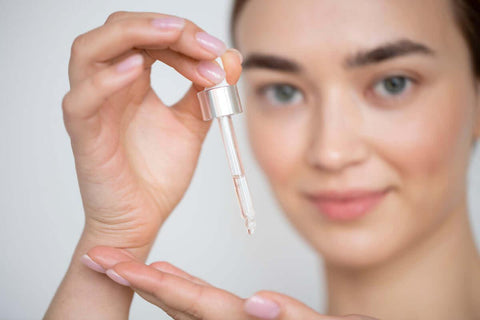글루타치온 복용 시 피해야 할 것은?

글루타치온은 종종 빛나고 젊어지는 능력으로 칭찬받습니다. 신체가 건강하고 빛나는 상태를 유지하는 데 도움이 되는 필수적인 항산화제로 널리 알려져 있습니다. 그러나 글루타치온이 수많은 이점을 제공하지만 복용할 때 염두에 두어야 할 몇 가지 주요 고려 사항이 있습니다. 누가 복용해야 합니까? 더 중요한 것은 일상에 글루타치온을 통합할 때 무엇을 피해야 합니까? 이러한 중요한 질문에 대해 깊이 알아보겠습니다.

글루타치온이란 무엇이고 왜 중요한가?
글루타치온 복용 시 무엇을 피해야 할지 이해하기 전에, 사람들이 이 강력한 항산화제 에 왜 이렇게 끌리는지 아는 것이 중요합니다 .
"마스터 항산화제"로 알려진 글루타치온은 신체에서 자연적으로 생성되며 유해한 자유 라디칼을 중화하고 면역 기능을 강화하는 데 필수적인 역할을 합니다. 신체 해독, 건강한 피부 증진, 전반적인 웰빙 지원에 있어서 강력한 힘을 발휘합니다.
글루타치온의 주요 이점:
-
항산화 보호: 글루타치온은 자유 라디칼을 효과적으로 중화시켜 세포와 조직을 산화 스트레스로부터 보호합니다.
-
해독: 독소와 결합하여 간을 지원하고 체내 노폐물을 통해 독소를 배출하는 것을 촉진하여 신체를 정화하는 데 도움이 됩니다.
-
항염 효과: 글루타치온은 다양한 만성 건강 문제의 원인인 염증을 줄이는 데 도움이 됩니다.
-
자외선 차단: 항산화제인 글루타치온은 피부를 자외선(UV) 복사선 의 손상으로부터 보호하는 데 도움이 될 수 있습니다 .
- 피부 미백: 많은 사람들이 과색소 침착을 줄이고 멜라닌 생성을 억제해 더 밝고 균일한 피부톤을 만들어 주는 글루타치온을 사용합니다.
이제 글루타치온의 이점을 알았으니, 긍정적인 효과를 극대화하기 위해 글루타치온을 복용할 때 피해야 할 사항에 대해 알아보겠습니다.

글루타치온 복용 시 피해야 할 것
글루타치온은 수많은 건강상의 이점을 제공하지만, 특정 습관과 물질은 그 효과를 방해할 수 있습니다. 피해야 할 핵심 사항은 다음과 같습니다.
1. 흡연 및 알코올 소비
흡연과 음주는 산화 스트레스를 상당히 증가시키고 신체에 과도한 자유 라디칼을 생성할 수 있습니다. 글루타치온의 주요 역할은 이러한 자유 라디칼을 중화하는 것이므로 이러한 습관에 빠지면 글루타치온의 긍정적인 효과가 상쇄될 수 있습니다. 글루타치온을 복용하는 경우 항산화제가 효과적으로 작용할 수 있도록 흡연과 음주를 줄이거나 중단하는 것이 가장 좋습니다.
2. 과도한 카페인 섭취
카페인 에 관해서는 절제가 중요합니다 . 적당한 섭취는 일반적으로 괜찮지만, 카페인을 너무 많이 섭취하면 글루타치온 수치가 고갈될 수 있습니다. 균형을 유지하려면 정기적으로 카페인을 섭취하는 경우 과일과 채소와 같이 글루타치온 전구체가 풍부한 음식을 식단에 통합하는 데 집중하세요.
3. 특정 약물
아세트아미노펜(타이레놀)과 아스피린과 같은 일부 약물은 특히 간에서 글루타치온 수치를 감소시킬 수 있습니다. 이는 신체의 유해 물질 해독 능력을 약화시켜 간에 추가적인 스트레스를 줄 수 있습니다. 이러한 약물을 정기적으로 사용하는 경우 글루타치온을 복용하기 전에 의료 전문가와 상의하는 것이 중요합니다.
4. 높은 유제품 섭취
락토오스 불내증이 있거나 유제품에 민감한 개인의 경우 유제품을 섭취하면 염증과 소화 문제가 발생할 수 있습니다. 이 염증은 글루타치온 생성을 지원하는 데 필요한 영양소의 신체 흡수를 방해할 수 있습니다. 유제품에 민감한 경우 신체의 글루타치온 활용을 개선하기 위해 섭취량을 줄이는 것을 고려하세요.
5. 튀긴 음식과 가공식품
튀긴 음식과 가공식품은 지방과 산화 함량이 높아 유해한 자유라디칼을 생성합니다. 이러한 음식을 과도하게 섭취하면 산화 스트레스가 증가하여 글루타치온이 자유라디칼을 중화하는 데 어려움을 겪습니다. 글루타치온의 기능을 지원하기 위해 항산화제가 풍부한 균형 잡힌 식단에 집중하세요.
6. 탈수
수분을 유지하는 것은 글루타치온의 생산과 효과를 포함한 전반적인 세포 기능 에 필수적입니다 . 탈수되면 세포가 최고조에 달할 수 없어 신체가 글루타치온을 효율적으로 합성하고 사용하는 능력이 제한됩니다. 글루타치온의 이점을 극대화하려면 매일 충분한 물을 마셔야 합니다.

글루타치온을 복용하기 전에 항상 의사와 상의하세요
글루타치온을 포함한 새로운 보충제 요법을 시작하기 전에 의료 서비스 제공자와 상의하는 것이 항상 현명한 생각입니다. 의사는 귀하의 현재 건강을 평가하고 귀하의 개별적인 필요와 상태에 따라 적절한 복용량을 추천할 수 있습니다.
자주 묻는 질문
-
글루타치온을 복용하는 동안 커피를 마셔도 괜찮을까요?
네, 하지만 적당히 하는 것이 중요합니다. 과도한 커피 소비는 자유 라디칼 증가로 이어질 수 있으며, 잠재적으로 글루타치온의 항산화 효과를 상쇄할 수 있습니다. 커피 섭취량을 산화 방지제가 풍부한 음식 과 균형 있게 조절해 보세요 . -
글루타치온을 복용하기 가장 좋은 시간은 언제인가요?
글루타치온은 언제든지 복용할 수 있지만, 더 나은 흡수를 위해 공복에 복용하는 것이 좋습니다. 어떤 사람들은 흡수를 더 촉진하기 위해 단백질이 풍부한 식사와 함께 복용하는 것을 선호합니다. -
글루타치온을 다른 약물과 함께 복용할 수 있나요?
글루타치온을 다른 약물과 병용하기 전에 의사와 상의해야 합니다. 특정 약물은 상호 작용하여 흡수나 효능에 영향을 미칠 수 있기 때문입니다.
결론
글루타치온은 해독, 항산화 보호, 항염 효과를 포함한 수많은 건강상의 이점이 있는 강력한 보충제 입니다 . 그러나 이러한 이점을 충분히 활용하려면 흡연, 과도한 카페인, 가공 식품과 같이 효과를 손상시킬 수 있는 습관과 물질을 피하는 것이 중요합니다. 수분을 유지하고 균형 잡힌 식단을 유지하면 글루타치온이 마법을 부리는 능력이 더욱 향상됩니다. 신체에 가장 적합한 선택을 하고 있는지 확인하기 위해 웰빙 루틴에 글루타치온을 추가하기 전에 항상 의료 서비스 제공자와 상의하십시오.




